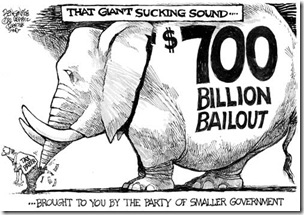Representation without listening to those who elect you to office.
To contract new debts is not the way to pay old ones.
-- GEORGE WASHINGTON, letter to James Welch, Apr. 7, 1799
 It is brutally obvious that the leaders we elected on Capitol Hill are not listening to what we the people want by passing this bill. By simply looking on the Internet at people's comments on the matter on ABC, CBS, NBC, FOX, CNN, etc. the average working-class American taxpayer does not want this bill passed. There have been demonstrations and protests on Wall Street, the White House, at the House, and at the Senate, against these bills, yet the Senate seems to think they have the answer and took initiative on their own accord to pass a bill hoping that basically the same bill, with a few tax cuts (for "special interests" not the average taxpayer) would sweeten the deal, and get passed in the House.
It is brutally obvious that the leaders we elected on Capitol Hill are not listening to what we the people want by passing this bill. By simply looking on the Internet at people's comments on the matter on ABC, CBS, NBC, FOX, CNN, etc. the average working-class American taxpayer does not want this bill passed. There have been demonstrations and protests on Wall Street, the White House, at the House, and at the Senate, against these bills, yet the Senate seems to think they have the answer and took initiative on their own accord to pass a bill hoping that basically the same bill, with a few tax cuts (for "special interests" not the average taxpayer) would sweeten the deal, and get passed in the House.
Back around 1750, the time Parliament in England had controlled colonial trade and taxed imports and exports heavily since 1660. The colonists at the time came to believe they were being deprived of a historic right. The English Bill of Rights 1689 had forbidden the imposition of taxes without the consent of Parliament. Since the colonists had no representation in Parliament they complained the taxed violated the guaranteed Rights of Englishmen. Parliament contended that the colonists had virtual representation, although there was no physical representation, or voice for the 13 Colonies in America, thus they were being taxed without someone speaking for them. In 1750 there was a sermon by a man named Reverend Jonathan Mayhew, and during a sermon he stated the following famous words: "No Taxation without representation."
Then King George III, after taking the throne of Britain in 1760, began placing many new laws on the colonies that were not beneficial to the Colonies. The first of these was the Sugar Act, which increased the import tax on sugar, textiles, coffee, wines and indigo dye. In 1764 James Otis, a lawyer raises the issue of taxes without representation again. He added to Reverend Mayhew's line by stating "Taxation without Representation is Tyranny."
King George III continued with taxes, and included an act called the Stamp Act in 1765 that allowed the British to tax newspapers, almanacs, legal documents, dice and even playing cards. This money earned from the taxes in the Colonies on those who were just trying to make a living, would not go to the colonies, but back to England. Thus, the Colonists were paying taxes on everything with nothing to show for it, other than back into the pockets of the wealthy in England. The Colonists were being taxed to death basically.
In 1774 the First Continental Congress met in Philadelphia with 56 delegates, representing every colony, except Georgia. Attendants included Patrick Henry, George Washington, Sam Adams and John Hancock. They declared opposition to King George III's acts, saying they are "not to be obeyed". The rights of the colonists are asserted, including the rights to "life, liberty and property."
It was because of these laws and acts passed by King George III on the colonies that was one of the main reasons for Americans to begin the Revolutionary War in 1775 which quite a few of my ancestors fought and died in from the Colonies and England.
Today we do elect leaders to "speak" for us in the Senate and the House, but what about when they don't listen to the masses? A good example of this would be a statement made October 1, on the Senate floor by Senator Diane Feinstein. She stated the following in regards to the "Bailout Bill" shortly before being voted on.
Mr. President, you know they say Senators have six year terms so that they can take tough votes when tough votes are called for so that they can vote for the best interest of their country, even sometimes when their constituents don't understand it or may be opposed to it. Mr. President, I received 91,000 phone calls and emails from California, 85,000 of them opposed to this measure. There's a great deal of confusion out there. People don't understand it...
....so Mr. President, I think if we really care about the livelihood of our constituents, there is only one vote, and it is yes.
-- Senator Diane Feinstein, October 1, 2008, Senate floor prior to "Bailout Bill" vote.
So with those few lines, Feindstein..err Feinstein (and no I don't live in California) stated that of the 91,000 phone calls she received, 93% of the people were opposed to this "Bailout Bill". She stated that they were "confused" regarding their opinion and thus they were clueless about what this bill is about. In other words, their opinion was not important. And with that, she stated to vote yes on the bill, and then she voted YES for the bill, with no regard to the opinion of those who called her, saying no to this bill. Can anyone please explain to me, how Feinstein represented the voice of those who she represents in her statements and her votes. And how she represented those of whom had told her they did not want this bill passed?
And if we do not understand this bill, and are "confused", is it not our representative's responsibility to help us understand, instead of leaving us clueless, and basically feeling that they are not listening to us? Is not this "Bailout Bill" the same thing as King George III's "Stamp Act"? Something that was forced on Americans, without regards to their opinions, that Americans paid for in taxes, with no voice in lawmakers' sessions, with nothing to show for it but poverty?
And if anyone can please explain how this $700 billion number came to be, please let me know. I do not mean where the money is going, I mean simply the figure of $700 billion.
Oh and one other thing, if you email me or leave a comment stating this isn't about taxes.. tell me, what if the banks can't pay back the money......................................
I leave you with a quote:
Thus what Congress needs to remember is that it is their actions, not their appointment, that make them a lawmaker, and that there is more expected from them, than the title.Remember that it is the actions, and not the commission, that make the officer, and that there is more expected from him, than the title.
GEORGE WASHINGTON, Address to the Officers of the Virginia Regiment, Jan. 8, 1756


0 Responses to "Representation without listening to those who elect you to office."
Post a Comment